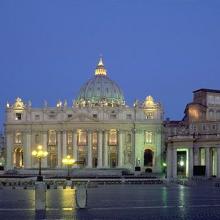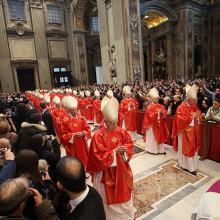cardinal sean o'malley
Collins, who was sexually abused by a priest at age 13, resigned on March 1, citing what she called “shameful” resistance to commission proposals from the Vatican’s powerful doctrinal office, which is responsible for pursuing cases against abusive priests and bishops.
Saunders stepped aside after publicly calling for Australian Cardinal George Pell to be dismissed, after news reports surfaced that he had protected pedophile priests in Australia. Pell serves as the Vatican’s finance chief.
“There is simply no justification in our day for failures to enact concrete safeguarding standards for our children, young men and women, and vulnerable adults,” O’Malley said.
“We are called to reform and renew all the institutions of our church. … And we certainly must address the evil of sexual abuse by priests.”
In a major setback for the pope, Collins on Mar. 1 announced that she had resigned from the Pontifical Commission for the Protection of Minors, established by the pontiff in 2013 to counter abuse in the church.
She said the pope’s decision to create the commission was a “sincere move,” but there had been “constant setbacks” from officials within the Vatican.
“There are people in the Vatican who do not want to change, or understand the need to change,” Collins said in a telephone interview from Dublin.
For much of its long history in the U.S., the Catholic Church was known as the champion of the working class, a community of immigrants whose leaders were steadfast in support of organized labor and economic justice – a faith-based agenda that helped provide a path to success for its largely working-class flock.
In recent decades, as those ethnic European Catholics assimilated and grew wealthier, and as the concerns of the American hierarchy shifted to battles over moral issues, such as abortion and gay marriage, traditional pocketbook issues took a back seat.

Cardinal Sean P. O'Malley. Image via Paul Haring/Catholic News Service/RNS
Catholic clergy have a “moral and ethical responsibility” to report sexual abuse, the cardinal tasked with reforming the Vatican’s approach to sexual crimes said after criticism of the Holy See. Boston Cardinal Sean O’Malley sought to reaffirm the church’s position on reporting abuse in his role as head of the Pontifical Commission for the Protection of Minors, which Pope Francis set up in 2014.
Pope Francis has approved the first-ever system for judging, and possibly deposing, bishops who fail to protect children from abusive clerics, a major step in responding to Catholics who have been furious that guilty priests have been defrocked while bishops have largely escaped punishment.
The five-point plan on accountability for bishops originated with the special sex abuse commission that Francis set up to deal with the ongoing crisis, and after some modifications, his nine–member Council of Cardinals signed off on it and Francis gave his final blessing to it on June 10.
When Pope Francis accepted the resignation of Missouri Bishop Robert Finn, who was convicted three years ago for failing to report a priest suspected of child abuse, he sent a powerful message to the Catholic Church.
Here are five takeaways from the news, which the Vatican announced on April 21.
1. This is a big deal.
During the past decade, the most intense years of the Catholic Church’s long-running clergy sex abuse scandal, thousands of priests have been punished or defrocked for abusing children, and a few bishops found guilty of molestation have also quit.
But until Finn, no American bishop had ever been forced from office (despite the terse Vatican announcement that he “resigned”) for covering up for a predator priest.
That sets a precedent in an institution where many have regarded the hierarchy as a privileged caste that should not be held to the same standards as others in the church. Some feared that if a bishop were pushed out for failing to do his job, it would create a domino effect that could topple the entire superstructure.
“We all know there are other U.S. bishops wondering ‘who is the next?’” tweeted church historian Massimo Faggioli.
But Francis seems to be betting this sort of accountability at the top will strengthen the church, and even help restore the credibility of the bishops.
2. Finn was an easy case.
Finn is the only U.S. bishop ever convicted in court of failing to report a suspected abuser, the Rev. Shawn Ratigan, who was later sentenced to 50 years on federal child pornography charges.
The U.S. cardinal who heads the Vatican’s commission on sexual abuse of children by clergy warned his fellow Roman Catholic bishops on Feb. 16 not to behave as if the problem had passed.
Cardinal Sean O’Malley of Boston told a conference at Rome’s Pontifical Gregorian University that some prelates were still reluctant to deal with the problem openly.
“It would be perilous for us, as leaders of the Church, to consider that the scandal of clergy sexual abuse is for the most part a matter of history and not a pressing concern here and now,” said O’Malley, whose commission advises Pope Francis on how to root out the abuse that has shamed the Church.
“Its not a pleasant topic. It’s easier just to ignore it and hope it will go away (but) when we are defensive and secretive, the results are disastrous,” he said in his speech.
Following up on remarks to “60 Minutes” about the clergy sex abuse crisis and other controversial topics, Boston Cardinal Sean O’Malley has stressed that the Catholic Church needs a system to hold bishops accountable and must “avoid crowd-based condemnations.”
“We are all aware that Catholics want their leaders to be held accountable for the safety of children, but the accountability has been sporadic,” O’Malley wrote in a column posted Nov. 19 at the website of the archdiocesan newspaper. “We need clear protocols that will replace the improvisation and inertia that has often been the response in these matters.”
“Bishops also deserve due process that allows them to have an opportunity for a fair hearing,” he added.
O’Malley’s column was responding to both praise and criticism of his CBS interview broadcast Nov. 16 in which he said the Vatican needs to respond “urgently” to cases like that of Missouri Bishop Robert Finn, who remains in office despite a conviction in 2012 for failure to report concerns about a priest, the Rev. Shawn Ratigan, who was later convicted of federal child pornography charges.
The cardinal said Francis, who recently sent a Canadian archbishop to Finn’s diocese to investigate, was personally aware of the situation.
In the “60 Minutes” interview, O’Malley also called the Vatican’s investigation of American nuns a “disaster” and said if he were starting a church “I’d love to have women priests,” but he added that’s not what Jesus did. Both comments sparked strong reactions.
Pope Francis on Monday held his first meeting with victims of clergy sex abuse, begging for forgiveness and promising to hold “accountable” the bishops who were complicit in covering up for predatory priests.
“Before God and his people I express my sorrow for the sins and grave crimes of clerical sexual abuse committed against you. And I humbly ask forgiveness,” the pope said, according to a Vatican transcript of his morning homily.
The Vatican could face a wave of new sexual abuse claims dating back decades if a United Nations inquiry finds that the Roman Catholic Church has violated an international treaty against torture and inhuman treatment.
“For too long, sexual violence and acts of rape by the Catholic Church have been minimized,” said Katherine Gallagher, senior staff attorney at the New York-based CCR, after the U.N. panel that enforces the torture convention held hearings in Geneva.
An Irish woman who was a victim of sexual abuse as a child is among eight members of a special commission appointed by Pope Francis on Saturday to start the long and arduous process of confronting the church’s chronic sexual abuse problems.
The creation of the commission is one of the strongest steps Francis has taken to confront the problem that has severely stained the church’s reputation and cost it billions in court settlements and legal fees. The pontiff has called the issue of sexual abuse “the shame of the church” and vowed to take strong steps to confront the issue.
Last Sunday night, the Rev. Thomas Rosica was walking through the Piazza Navona in Rome’s historic center when he bumped into Cardinal Jorge Bergoglio, who he has known for years. Bergoglio was walking alone, wearing a simple black cassock and he stopped and grabbed Rosica’s hands.
He had reason to be worried. Two days later, on Tuesday evening, he and 114 other cardinals entered the conclave to elect a successor to Benedict XVI; a little more than 24 hours and five ballots after that, Bergoglio emerged on the balcony of St. Peter’s Basilica as Pope Francis. “I want you to pray for me,” the Argentine cardinal told Rosica, a Canadian priest who was assisting as a Vatican spokesman during the papal interregnum. Rosica asked him if he was nervous. “A little bit,” Bergoglio confessed.
It was a surprising outcome, and even if Bergoglio suspected something was up, few others did, including many of the cardinals in the Sistine Chapel with him.











